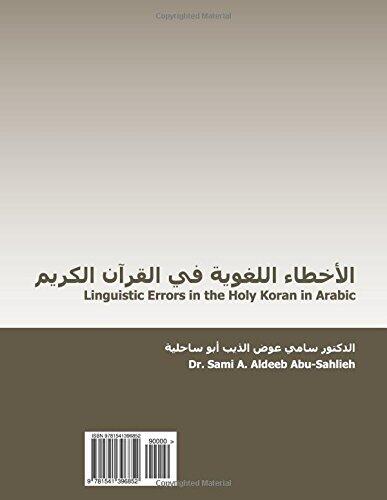
Al-Akhta' Al-Lughawiyyah Fi Al-Qur'an Al-Karim: Linguistic Errors in the Holy Koran
بواسطة
Sami a Aldeeb Abu-Sahlieh
لا توجد تقييمات بعد
History
تنسيق
غلاف ورقي
صفحات
500
لغة
العربية
منشور
Jan 2, 2017
الناشر
CreateSpace Independent Publishing Platform
الطبعة
Annotated
رقم ISBN-10
1541396855
رقم ISBN-13
9781541396852
الوصف
Sami A. Aldeeb Abu-Sahlieh delves into the intricate linguistic landscape of the Holy Quran, meticulously highlighting notable discrepancies and errors that linger beneath its revered surface. In this exploration, he juxtaposes traditional interpretations with modern linguistic analysis, shedding light on the complexities of Quranic Arabic. His approach is analytical yet respectful, aiming to foster a deeper understanding of the text while inviting readers to appreciate its historical and cultural context.
Throughout the work, Aldeeb Abu-Sahlieh engages with various linguistic dimensions, examining syntax, semantics, and stylistic choices that may deviate from established norms. These inquiries not only provoke thought but also challenge some longstanding interpretations, prompting readers to rethink their understanding of the Qur'an. The language is accessible, ensuring that both scholars and casual readers can engage with the discussion.
Ultimately, this examination serves as a bridge between the ancient text and contemporary linguistic studies, contributing to ongoing dialogues within Arabic linguistics and Quranic studies. By addressing these linguistic aspects with clarity and respect, Aldeeb Abu-Sahlieh invites further exploration and discourse on the implications of language in religious texts.
Throughout the work, Aldeeb Abu-Sahlieh engages with various linguistic dimensions, examining syntax, semantics, and stylistic choices that may deviate from established norms. These inquiries not only provoke thought but also challenge some longstanding interpretations, prompting readers to rethink their understanding of the Qur'an. The language is accessible, ensuring that both scholars and casual readers can engage with the discussion.
Ultimately, this examination serves as a bridge between the ancient text and contemporary linguistic studies, contributing to ongoing dialogues within Arabic linguistics and Quranic studies. By addressing these linguistic aspects with clarity and respect, Aldeeb Abu-Sahlieh invites further exploration and discourse on the implications of language in religious texts.